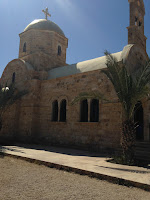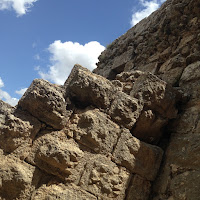Journey to Jordan
Thursday, June 16, 2016
Remembering
The phrase "I remember when..." is something that simultaneously warms my heart and worries me that I'm about to hear a long winded story of when you could buy a gumball for a penny. I've been back in America now for close to a month, and even though my blog posts have become considerably more spaced out, I'm starting to find myself more and more starting stories with "I remember a story from when I was in Jordan..."
Remembering is a funny thing. Grasping at past experiences seems to be about as easy as catching dust. Despite the unattainability of the raw experiences in their original form, there is a profound comfort in the fleeting resurgence of old feelings. It's like low fat ice cream, it's not the real thing, but when you don't have the option of having the original sometimes you settle for what's available.
When I was in Jordan, there were countless moments of remembering people, activities, food, and more from America. Now that I'm back in America, the opposite is true. Some days I just want a good piece of Kinafeh, or I want to be able to try to talk to somebody in Arabic, or I just want to say hello to old friends.
These are all examples of remembering on an individual level, but there's also a type of communal remembrance that happens in cultures. The can be a small community remembrance, like a family who will never forget the time the turkey was burnt on Thanksgiving. It can be bigger, like Cleveland's obsession with leg lamps. Or even bigger, like the world remembering the tragedy of 9/11.
The interesting thing is how there are so many different memories that shape how we define ourselves. For example, Israelis have a lot of memories of Palestinian terrorist attacks, while Palestinians have memories of Israeli terrorist attacks. It seems like two collective memories can easily form, and sometimes this is what makes unity so difficult. When a drone strike in Yemen kills innocent civilians, the people in Yemen will remember it vividly, just like Americans remember the killing of our innocent civilians. Now what forms is people with memories of what we simplify as "the West" coming in and killing their relatives and friends, while "the West" has a collective memory of the very opposite.
Remembrance is an important thing. A couple of weeks after I got back I went to a Memorial Day service, and that was just one of the sobering times when we are reminded to remember. I think it is equally important what we chose to remember One of the great things I learned about remembrance while in Jordan is that there is no limit to it. Often times there is a notion that memories fill up a container, and there's a certain point where that container gets full and no new memories can be added. If that were the case, I would have forgotten much more English while I was learning Arabic. Adding new memories, memories of Syrians slain in a violent civil war, memories of Palestinians who have lost their homes, memories of Israelis who have lost their lives, memories of Iraqis who died of malnutrition in the 90's are all things we can add to our collective memories. The beautiful thing about adding them is it gives us common ground with those who often feel distant from us, estranged by our differences. I'm not saying that's enough to end violence, or create world peace, but it is enough to give life to the past, and to create a better now.
Friday, June 3, 2016
Queen
Disclaimer, this is not a blog post about a British rock band, but it is one about how Jordan is governed by a monarchy. Despite the fact Jordan's monarchy doesn't a powdery old British woman, it are still quite popular. The monarchy came to power a hundred years ago, after the great Arab revolt. In fact May 25th was Jordanian Independence day.
Jordanian independence was a long struggle, and it started with the overthrowing of the Ottoman Empire by the Hashemite Kingdom (the royal family that still rules Jordan today). Admittedly, I don't know much about the overthrow of the Ottoman empire to form Jordan. I never found a hyper dramatized portrayal of it playing on the history channel in my youth, so instead I stuck with my knowledge of what made World War I so bloody, instead of the politics of revolutions being paid for by the allies during it. What I do know slightly more about, despite my inability to locate Jordanian tabloids, is the royal family in Jordan. King Abdullah Hussein II has been ruling Jordan since 1999, and his wife, Queen Rania, has been at his side through it all. They have 3 children together, and their oldest son, Prince Hussein, goes to college at none other than Georgetown University.
In Jordan, it is against the law to say anything negative against the royal family. As restrictive as that seems to many Americans, most Jordanians don't have many negative things to say about the royal family. Most people are either preoccupied with Queen Rania's beauty, or King Abdullah Hussein's finesse. I was once in the car with a taxi driver who had King Hussein as his background. and even kissed the picture he liked the king so much.
Because of political structures in the Middle East, the royal family has held a lot of the power in government for a long time. After the Arab Spring uprisings, King Abdullah made the bold move of having parliament elected by the general public, instead of handpicking those in the top positions. Recently, the King has been criticized for taking steps backwards on some of his policies, but none the less he is still heralded as allowing more freedom than many other monarchs.
What impressed me the most about the royal family in Jordan was not how they were portrayed in the media, or talked about in the international community, but the stories you would here about what they would do with their power in Jordan. Queen Rania recently received an award for being influential in the battle over punishments against honor killings (a murderer enacted on young women by their male relatives if they are thought to be too promiscuous before marriage). She can also be found dining with a childhood friends, who owns multiple cafes in Amman, who is one of the few public figures in Jordan who is openly gay.
The monarchy also plays a touchy game of politics, and are often criticized from every angle about not doing enough, or doing too much, much like politics everywhere. They still seem to have to ability to push for small changes that represent important impacts. Observing the royal family in Jordan is a reminder that nobody can use the power they have perfectly, but that we can still all influence the world around us by utilizing what power we do have.
Sunday, May 8, 2016
Petra, Porto Dead Sea, and Pictures
Tourism is a vital part of the Jordanian economy, on average it is 20% of Jordan's GDP. There are numerous good reasons for this. Jordan is full of beautiful sites to see. Petra (one of the seven wonders of the world), Wadi Rum (the site for the filming of "The Martian"), the Dead Sea (the lowest point on earth), Ajloun castle (A castle built during the crusades), Jerash Roman ruins, Aqaba and the Red Sea, not to mention the countless activities to do in Amman. All of these nifty historical sites are combined with an incredibly hospitable culture and delicious food to make Jordan an amazing destination.
Still, in the past couple of years the tourism industry here has taken a hit. Because of its geographic location, often times people are frightened that they would not be safe in Jordan. In my experience this has not been true. The last terrorist attack in Jordan happened in 2005, and since then Jordan has increased its security apparatus. Jordan's intelligence agency has an open door policy with America, and has the largest transfer of information between American secret service behind Britain. This isn't to say nothing bad could even happen in Jordan, but Jordan has also withstood the regional turmoil and has been able to ward off opportunities for violence inside of its borders.
Jordan not only has a history of being a safe and exciting tourist destination, it also has plans looking into the future. Next to the Dead Sea, Jordan is currently in the process of developing an attraction called "Porto Dead Sea". The area would hold four 5-Star hotels, as well as offering leisure activities such as an amusement park, movie theater, golf course, and dancing area. This project signifies a large investment in the future of tourism in Jordan, a future that's sure to be worth experiencing.
Now, instead of telling the great experiences I've had visiting all these sites in Jordan, I think it's best to instead put up pictures from my adventures here. They by no means cover even a fraction of all there is to experience in Jordan, but they're a window into this gorgeous part of the world and show just how beautiful time spent here can be.




























Still, in the past couple of years the tourism industry here has taken a hit. Because of its geographic location, often times people are frightened that they would not be safe in Jordan. In my experience this has not been true. The last terrorist attack in Jordan happened in 2005, and since then Jordan has increased its security apparatus. Jordan's intelligence agency has an open door policy with America, and has the largest transfer of information between American secret service behind Britain. This isn't to say nothing bad could even happen in Jordan, but Jordan has also withstood the regional turmoil and has been able to ward off opportunities for violence inside of its borders.
Jordan not only has a history of being a safe and exciting tourist destination, it also has plans looking into the future. Next to the Dead Sea, Jordan is currently in the process of developing an attraction called "Porto Dead Sea". The area would hold four 5-Star hotels, as well as offering leisure activities such as an amusement park, movie theater, golf course, and dancing area. This project signifies a large investment in the future of tourism in Jordan, a future that's sure to be worth experiencing.
Now, instead of telling the great experiences I've had visiting all these sites in Jordan, I think it's best to instead put up pictures from my adventures here. They by no means cover even a fraction of all there is to experience in Jordan, but they're a window into this gorgeous part of the world and show just how beautiful time spent here can be.




























Subscribe to:
Comments (Atom)














































